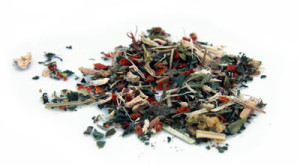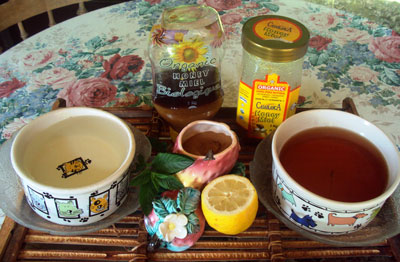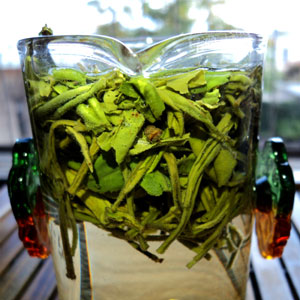Does your dog or cat try to sneak a sip of your morning tea? Ever wonder if you should offer your pet its own cup? According to Dog Behaviorist and Canine Holistic Wellness Advisor, Karen Rosenfeld, you not only can but should give your pets their own cup of tea.
“Tisanes can be antibacterial, antifungal, antispasmodic, analgesic, anti-inflammatory, antimicrobial and even an antidepressant,” said Rosenfeld. “It is just amazing what tea offers for our pets.”
 To optimize the health benefits of a tisane, choose organic when available or use fresh herbs from your garden. In addition, pay careful attention to the size of your pet, adjusting the dose accordingly. Rosenfeld recommends 1/16 teaspoon of dried herbs for dogs and cats that are up to 10 pounds and no more than 2 teaspoons for dogs over 100 pounds. As far as teas to avoid, black and caffeinated green tea should never be given to pets. Caffeine can be extremely toxic for your four-legged friend.
To optimize the health benefits of a tisane, choose organic when available or use fresh herbs from your garden. In addition, pay careful attention to the size of your pet, adjusting the dose accordingly. Rosenfeld recommends 1/16 teaspoon of dried herbs for dogs and cats that are up to 10 pounds and no more than 2 teaspoons for dogs over 100 pounds. As far as teas to avoid, black and caffeinated green tea should never be given to pets. Caffeine can be extremely toxic for your four-legged friend.
Rosenfeld recommends tea to most of her holistic clients and offers a cup of tea to her pooches on a daily basis, brewing either decaffeinated green tea or rooibos. The tea is cooled then poured directly on top of their food. The benefits of rooibos tea for pets are similar to those in humans, offering a boost to their immune systems. Rooibos also works wonders, shares Rosenfeld, for those pets that are suffering from skin allergies and anxiety.
 Decaffeinated green tea and its extract may assist with a variety of ailments in pets, from treating cancer to assisting with bad breath. “Green tea is fantastic for dogs, providing that you are using decaffeinated and to adjunct the antioxidant properties of the green tea, you should use fresh lemon juice,” said Rosenfeld. She recommends using green tea for everything from topically treating an eye infection (3 to 5 drops in the eye) to cleaning your pet with a green tea body wash. However, the ASPCA recommends using green tea with caution, advising that even with decaffeinated blends; some pets may experience stomach pain.
Decaffeinated green tea and its extract may assist with a variety of ailments in pets, from treating cancer to assisting with bad breath. “Green tea is fantastic for dogs, providing that you are using decaffeinated and to adjunct the antioxidant properties of the green tea, you should use fresh lemon juice,” said Rosenfeld. She recommends using green tea for everything from topically treating an eye infection (3 to 5 drops in the eye) to cleaning your pet with a green tea body wash. However, the ASPCA recommends using green tea with caution, advising that even with decaffeinated blends; some pets may experience stomach pain.
Wary about giving your pet green tea? Have no fear, other herbs can be just as beneficial. Chamomile (either the tea or flower) is wonderful for reducing anxiety and also to topically treat eye infections. Meanwhile warming ginger root, either as tea or placed directly in food, can help relieve nausea and improve vascular circulation. This is particularly beneficial to dogs with short fur that may be sensitive to cooler nights. In fact, she regularly gives ginger root to her boxer Robbie, adding the root to his daily salad.
“Tisanes are a valuable nutraceutical for dogs,” said Rosenfeld. “If you choose not to give them, you will lose access to some amazing health benefits.” Whether you choose to make your own or buy a blend created for pets, take the time to share a cup with your pet today.
Cautionary Note: When using herbs as part of a treatment plan, it is important to check for any potential interactions with medications. In addition, always double check with your veterinarian to make sure that both the herbs and dosage are safe for your pet to consume.








